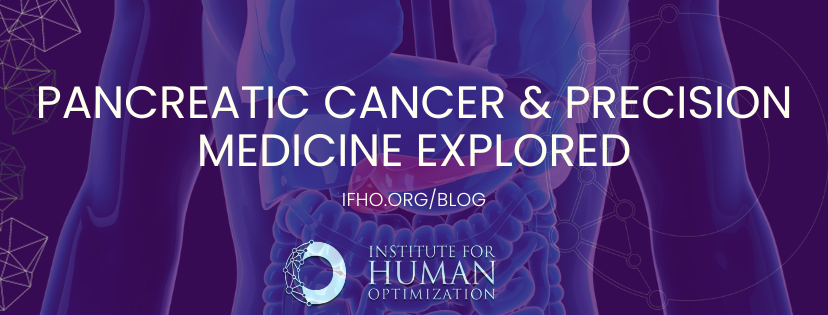Precision Medicine and The Future of Pancreatic Cancer
Pancreatic cancer, also known as pancreatic carcinoma, is one of the most challenging cancers to treat. The American Cancer Society’s estimates for pancreatic cancer in the United States for 2023 are that about 64,050 people (33,130 men and 30,920 women) will be diagnosed with pancreatic cancer. Of those individuals the American Cancer Society estimates that 50,550 people (26,620 men and 23,930 women) will die of pancreatic cancer. This type of cancer has a very low survival rate and is often diagnosed at a late stage, making treatment even more difficult. Early intervention and improving Pancreatic Cancer outcomes holds a special place in our heart at the Institute for Human Optimization. This week on the blog we will explore the exciting advancements in precision medicine that may change the future of pancreatic cancer treatment.
. . .
Pancreatic cancer persists as a major health concern due to several daunting challenges associated with its diagnosis and treatment. Typically, symptoms do not manifest until the cancer has progressed significantly, often to an advanced stage. By this point, the tumor has usually metastasized to other parts of the body, complicating treatment and significantly worsening the prognosis. Further exacerbating the medical community’s struggle with this disease is its resistance to conventional treatment methods, such as chemotherapy and radiation. The tenacity of pancreatic cancer, coupled with the difficulty of early detection, underscores the urgent need for innovative approaches. This is where precision medicine comes into play, with its promise of targeted and personalized treatment strategies.
What is Precision Medicine?
Precision medicine, also known as personalized or individualized medicine, is a relatively new approach to healthcare that takes into account an individual’s unique genetic makeup, environment, and lifestyle when making treatment decisions. This contrasts with traditional “one-size-fits-all” approaches in which patients with the same disease receive similar treatments regardless of their genetic differences. Precision medicine aims to tailor treatments specifically for each patient, taking into consideration factors such as their genetics, environment, and lifestyle. In a nut shell, it is the right drug or intervention for the right patient at the right time.
What is Precision Oncology?
Precision oncology is a subset of precision medicine that focuses specifically on cancer. It involves using advanced technology such as genomic testing to analyze a patient’s tumor and identify specific genetic mutations that may be driving the cancer’s growth. These mutations can then be targeted with personalized treatments, which may include targeted therapies, immunotherapies, or combination therapies.
Knowing Your Tumor’s Genetic Profile
Traditionally, pancreatic cancer treatment has been limited to surgery, chemotherapy, and radiation therapy. With precision medicine, the goal is to identify the specific genetic mutations driving a patient’s cancer growth and tailor treatment accordingly. This can be achieved through genomic testing of a tumor sample.
Genomic testing involves analyzing the DNA of the tumor cells to look for genetic alterations or mutations. These mutations can provide valuable information about the tumor’s behavior and potential vulnerabilities. This allows doctors to create a personalized treatment plan that targets these specific mutations, potentially leading to more effective and less toxic treatments.
Organoids which are miniature versions of a patient’s tumor grown in a laboratory setting, can also be used to test potential treatments and predict their effectiveness before administering them to the patient. Organoids are fascinating tools that may revolutionize personalized medicine in the future.
Precision Medicine in Action: PARP Inhibitors
One example of precision medicine in action is the use of PARP inhibitors for pancreatic cancer patients with BRCA mutations. PARP inhibitors are a type of targeted therapy that prevents cancer cells from repairing their own DNA, leading to cell death. BRCA mutations occur in about 7% of pancreatic cancer patients and have been linked to an increased risk of developing the disease. Studies have shown that pancreatic cancer patients with BRCA mutations may respond well to treatment with PARP inhibitors, making them a promising option for personalized treatment.
GRAIL Galleri Test
Another exciting development in precision medicine is the GRAIL Galleri test, a blood test that screens for multiple types of cancer by detecting DNA fragments shed by tumors into the bloodstream. This test could potentially detect pancreatic cancer at an earlier stage when treatment is more likely to be successful. While this test is still in clinical trials, it holds great promise for improving early detection and ultimately, survival rates for pancreatic cancer patients. At the Institute for Human Optimization, we offer this Early Multi Cancer Detection test.
Full-Body MRI Scans
Full-body MRI scans becoming more accessible are another technology that could play a role in precision medicine for pancreatic cancer. These scans can detect small tumors and lesions in various organs, providing valuable information about the spread of the disease and potential treatment options. While there have been concerns on “incidentalomas” or finding unrelated findings on these scans, radiology imaging has advanced to distinguish between cancerous and non-cancerous tissues with high accuracy.
The Future of Pancreatic Cancer Treatment
Precision medicine is still in its early stages, but it holds immense promise for improving the diagnosis and treatment of pancreatic cancer. By taking into account an individual’s unique genetic makeup and tumor profile, precision medicine allows doctors to provide more targeted and effective treatments that may improve outcomes for patients. As technology continues to advance, we can hope for more innovative approaches and breakthroughs in the fight against this devastating disease. With precision medicine at the forefront, there is renewed hope for a future where pancreatic cancer is no longer a death sentence. So let’s continue to support research and advancements in precision medicine, because every life matters.
References
- https://www.ncbi.nlm.nih.gov/pmc/articles/PMC10046065/
- https://www.ncbi.nlm.nih.gov/pmc/articles/PMC8682800/
_





Leave a Reply
Want to join the discussion?Feel free to contribute!